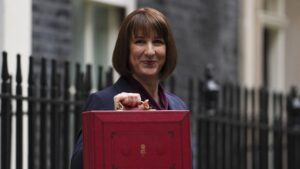Disposable income levels to worsen and wages to stagnate in wake of budget, says thinktank
Chancellor Rachel Reeves’ budget has left the outlook for growth and living standards remaining weak in this parliament, the Resolution Foundation says.

The next five years will hurt disposable income and wages will stagnate further following Chancellor Rachel Reeves’ budget, an influential thinktank has said.
Household disposable income, or living standards, will be the worst under any Labour government since 1955 when inflation is factored in, the Resolution Foundation said.
Politics latest: ‘Everything has to be paid for’: Reeves defends £40bn tax rises
The thinktank also said pay will stagnate in the middle of the parliament as higher inflation lessens pay rises and growth is slowed in an already challenging economic environment.
It will mean that in 2028, pay adjusted for inflation – real wages – is forecast to have grown on average by just £13 a week over the past 20 years, according to analysis from the foundation.
Previous analysis from the thinktank showed weekly wages had increased by just £16 in 14 years when inflation was factored in.
But the foundation added that households’ disposable income will grow more throughout the five-year parliamentary term than the last – by an expected 0.5% a year, compared to 0.3% under the Conservative government.
Read more:
The main announcements in the budget
See if you are better or worse off using our budget calculator
Feeling blindsided? Chancellor’s budget is a huge gamble
Rising prices
Prices will rise more because of the budget and growth will be weaker in part due to the rise in employer’s national insurance, it added.
Inflation will rise as a result of employers passing on the national insurance contributions to customers, the introduction of VAT on private school fees and the reform of vehicle tax, the Office for Budget Responsibility (OBR) said.
The OBR predicts UK economic growth to be 1.1% in 2024, peaking at 2% in 2025 before falling to 1.85% in 2026, 1.5% in 2027, and 1.5% in 2028 before rising again to 1.6% in the final year of the parliament.
👉 Listen to Politics At Jack And Sam’s on your podcast app👈
The OBR reached the same conclusion as the Resolution Foundation on disposable income. It also anticipates it will grow just over 0.5% a year.
‘Silly games playing’
Key analysis from another respected thinktank, the Institute for Fiscal Studies (IFS), said the budget was based on the same “silly games playing” as the previous government, by planning “implausibly low” spending increases for government departments to meet the debt reduction target.
Underpinning the “silly game” was Ms Reeves’s announced fuel duty freeze and reduced government spending from 2025 after promised larger spending this year, the IFS said.
“Let’s pretend we’ll increase fuel duties next time, but not do it this year,” said IFS director Paul Johnson.
“Let’s pretend that we’ll really rein in spending in a couple of years after splurging this year.
“It sounds like it was hard enough to get agreement from departmental ministers to relatively generous settlements in the short term. When it comes to settling with departments for the period after 2025-26, keeping within that 1.3% envelope will be extremely challenging – to put it mildly.”
Some positive response
The International Monetary Fund (IMF) has broadly welcomed the UK budget, praising the proposed debt reduction targets and tax-raising measures.

Keep up with all the latest news from the UK and around the world by following Sky News
The focus on boosting growth and increasing public investment was singled out in their comment as was the move to having only one fiscal event, a budget, a year.


